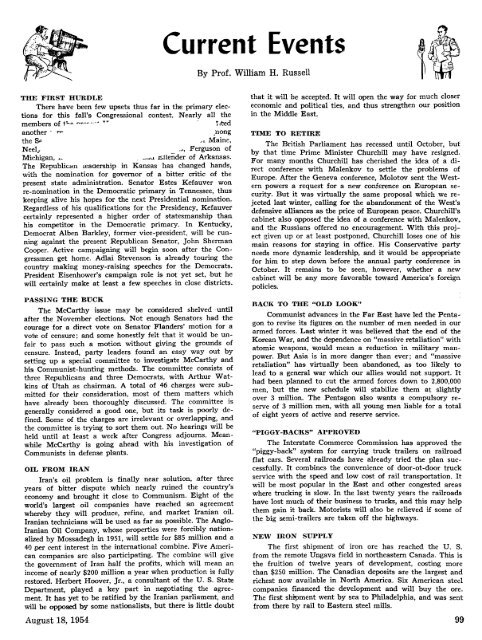Covenanter Witness Vol. 53 - Rparchives.org
Covenanter Witness Vol. 53 - Rparchives.org
Covenanter Witness Vol. 53 - Rparchives.org
You also want an ePaper? Increase the reach of your titles
YUMPU automatically turns print PDFs into web optimized ePapers that Google loves.
Current EventsByProf. William H. RussellTHE FIRST HURDLEThere have been few upsets thus far in the primary elections for this fall's Congressional contest. Nearlymembers of tv= ~- "all theTttedanother ' r*- nongthe S-iMaine,.Neel.,.^,Ferguson ofMichigan, *. -..n lillender of Arkansas.The Republican ieaaership in Kansas has changed hands,with the nomination for governor of a bitter critic of thepresent state administration. Senator Estes Kefauver wonre-nomination in the Democratic primary in Tennessee, thuskeeping alive his hopes for the next Presidential nomination.Regardless of his qualifications for the Presidency, Kefauvercertainly represented a higher order of statesmanship thanhis competitor in the Democratic primary. In Kentucky,Democrat Alben Barkley, former vice-president, will be running against the present Republican Senator, John ShermanCooper. Active campaigning will begin soon after the Congressmen get home. Adlai Stevenson is already touring thecountry making money-raising speeches for the Democrats.President Eisenhower's campaign role is not yet set, but hewill certainly make at least a few speeches in close districts.PASSING THE BUCKThe McCarthy issue maybe considered shelved untilafter the November elections. Not enough Senators had thecourage for a direct vote on Senator Flanders' motion for avote of censure; and some honestly felt that it would be unfair to pass such a motion without giving the grounds ofcensure. Instead, party leaders found an easy way out bysetting up a special committee to investigate McCarthy andhis Communist-huntingmethods. The committee consists ofthree Republicans and three Democrats, with Arthur Watkins of Utah as chairman. A total of 46 charges were submitted for their consideration, most of them matters whichhave already been thoroughly discussed. The committee isgenerally considered a good one, but its task is poorly defined. Some of the charges are irrelevant or overlapping, andthe committee is trying to sort them out. No hearings will beheld until at least a week after Congress adjourns. Meanwhile McCarthy is going ahead with his investigation ofCommunists in defense plants.OIL FROM IRANIran's oil problem is finally near solution, after threeyears of bitter dispute which nearlyeconomyruined the country'sand brought it close to Communism. Eight of theworld's largest oil companies have reached an agreementIranian Oil Company, whose properties were forcibly nationalized by Mossadegh in 1951, will settle for $85 million and a40 per cent interest in the international combine. Five American companies are also participating. The combine will givethe government of Iran half the profits, which will mean anincome of nearly $200 million a year when production is fullyrestored. Herbert Hoover, Jr., a consultant of the U. S. StateDepartment, played a keypart in negotiating the agreement. It has yet to be ratified by the Iranian parliament, andwill be opposed bysome nationalists, but there is little doubtthat it will be accepted. It will open the way for much closereconomic and political ties,in the Middle East.TIME TO RETIREand thus strengthen our positionThe British Parliament has recessed until October, butby that time Prime Minister Churchill may have resigned.For many months Churchill has cherished the idea of a direct conference with Malenkov to settle the problems ofEurope. After the Geneva conference, Molotov sent the Western powers a request for a new conference on European security. But it was virtually the same proposal which we rejected last winter, calling for the abandonment of the West'sdefensive alliances as the price of European peace. Churchill'scabinet also opposed the idea of a conference with Malenkov,and the Russians offered no encouragement. With this project given up or at least postponed, Churchill loses one of his'main reasons for staying in office. His Conservativewhereby they will produce, refine, and market Iranian oil.Iranian technicians will be used as far as possible. The Anglo-partyneedsmore dynamic leadership, and it would be appropriatefor him to step down before the annual party conference inOctober. It remains to be seen, however, whether a newcabinet will be any more favorable toward America's foreignpolicies.BACK TO THE "OLD LOOK"Communist advances in the Far East have led the Pentagon to revise its figures on the number of men needed in ourarmed forces. Last winter it was believed that the end of theKorean War, and the dependence on "massiveretaliation"withatomic weapons, would mean a reduction in military manpower. But Asia is in more danger than ever; and "massiveretaliation"has virtually been abandoned, as too likely tolead to a general war which our allies would not support. Ithad been planned to cut the armed forces down to 2,800,000men, but the new schedule will stabilize them at slightlyover 3 million. The Pentagon also wants a compulsory reserve of 3 million men, with all young men liable for a totalof eight years of active and reserve service."PIGGY-BACKS"APPROVEDThe Interstate Commerce Commission has approved the"piggy-back"system for carrying truck trailers on railroadflat cars. Several railroads have already tried the plan successfully. It combines the convenience of door-ot-door truckservice with the speed and low cost of rail transportation. Itwill be most popular in the East and other congested areaswhere trucking is slow. In the last twenty years the railroadshave lost much of their business to trucks, and this may helpthem gain it back. Motorists will also be relieved if some ofthe big semi-trailers are taken off the highways.NEW IRON SUPPLYThe first shipment of iron ore has reached the U. S.from the remote Ungava field in northeastern Canada. This isthe fruition of twelve years of development, costing morethan $250 million. The Canadian deposits are the largest andrichest now available in North America. Six American steelcompanies financed the development and will buy the ore.The first shipment went by sea to Philadelphia,and was sentfrom there by rail to Eastern steel mills. 99August 18, 1954
















